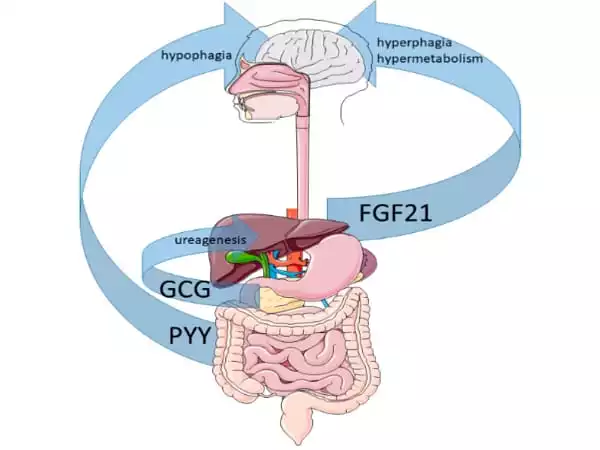A single hormone appears to be responsible for the lifetime extension caused by a low-protein diet. In old mice, low-protein diets have favorable metabolic benefits, enhancing metabolic health, lowering frailty, and extending lifespan. These favorable effects were also shown in middle-aged mice when protein intake was lowered, even protecting against the negative effects of obesity. These favorable effects were lost in mice lacking FGF21, indicating that its activation in the brain is crucial for the increase in health and longevity.
A new study from Pennington Biomedical Research Center, published in the journal Nature Communications, discovered that reducing protein in the diet produced a variety of positive health outcomes, including an increase in lifespan, and that these effects are dependent on a liver-derived metabolic hormone called Fibroblast Growth Factor 21. (FGF21).
It has long been recognized that eating less improves health and increases lifespan, and there has been growing attention in the notion that limiting protein or amino acid intake contributes to this beneficial effect. Several recent studies suggest that diets low in protein but not so low as to cause malnutrition can benefit health. Conversely, overconsumption of high-protein diets has been linked to increased mortality in certain age groups.
This innovative study has significant implications for extending people’s health and lifespan. If scientists can better understand how diets and nutritional hormones like FGF21 work to lengthen lifespan, they may be able to balance many of the health problems that occur in middle age and later.
John Kirwan
Pennington Biomedical’s Neurosignaling Laboratory discovered a few years ago that the metabolic hormone FGF21 was a vital signal connecting the body to the brain during protein limitation. When young mice were fed a low-protein diet, they did not affect their feeding behavior or metabolism.
“Our findings imply that FGF21 communicates with the brain, and that without this signal, the mouse is unaware that it is consuming a low-protein diet. As a result, the mouse is unable to modify its metabolic or feeding behavior “Professor and Director of the Neurosignaling Lab Christopher Morrison, Ph.D.

The group’s most recent study, conducted by postdoctoral researcher Cristal M. Hill, Ph.D., shows that low-protein diets improve metabolic health, reduce frailty, and lengthen lifespan in elderly mice. These favorable effects were also shown in middle-aged mice when protein intake was lowered, even protecting against the negative effects of obesity. These favorable effects were lost in mice lacking FGF21, indicating that its activation in the brain is crucial for the increase in health and longevity.
“We previously demonstrated that FGF21 improves metabolic health in young mice on a low-protein diet through acting in the brain. These new findings expand on previous research by revealing that FGF21 improves metabolic health and increases lifespan. These findings show that FGF21 is the first known hormone that links feeding behavior and metabolic health to improve lifespan during protein restriction” Dr. Hill stated.
Dr. Hill, on the other hand, stated that significant questions remain. It’s unclear how these findings will apply to aging humans, but the aim is that this research may identify new biochemical and brain pathways that can be used to improve people’s health.
“This innovative study has significant implications for extending people’s health and lifespan. If scientists can better understand how diets and nutritional hormones like FGF21 work to lengthen lifespan, they may be able to balance many of the health problems that occur in middle age and later” said John Kirwan, Ph.D., Executive Director of Pennington Biomedical.














